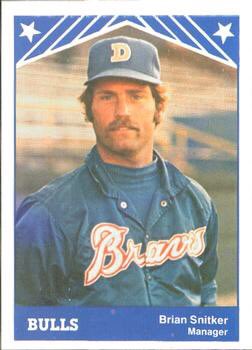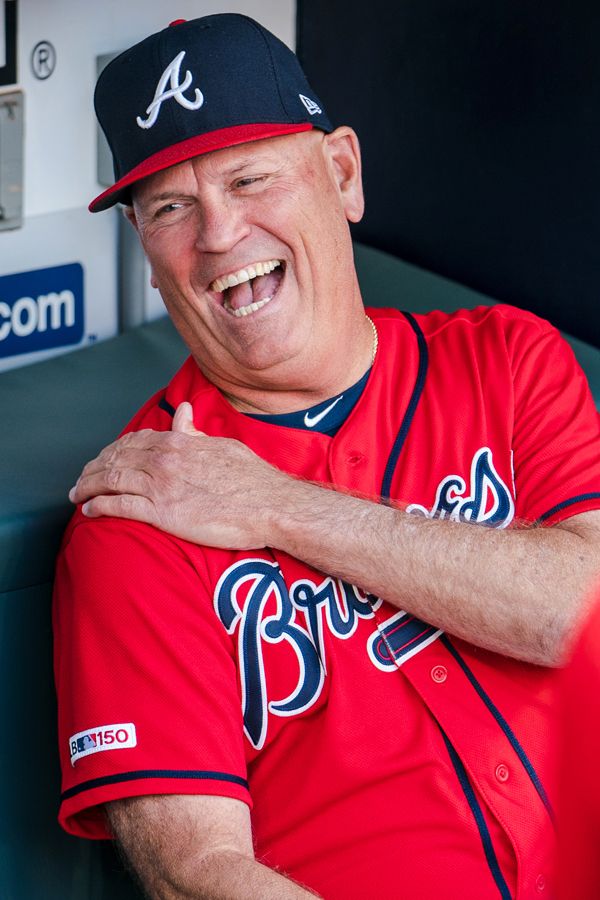The Atlanta Braves are having a dream season. At this writing they have the best record in baseball.
At their home ballpark, fans are filling the seats, resulting in a record number of sellouts.
The franchise is one of the most popular in the game. When the Braves play in other cities, tomahawk-chopping fans often outnumber those of the home team.
You can credit the Braves’ success to any number of reasons: great players, good coaches, expert scouting, or solid ownership.
However, I’d like to single out one guy. Brian Snitker. Everybody calls him Snit. So will I.
I’ve written before about Snit’s backstory. He’s a Braves “lifer.” Most 67-year-old baseball guys have been traded, hired, and fired repeatedly. Not Snit. He’s been a Brave since Day One, and that day was in 1977.
For most of four decades he rode on buses and stayed in low-star motels, dining on fast food. He got a brief taste of major league life on the Braves coaching staff, only to be sent back to the minors after manager Bobby Cox retired.
When the 2016 season became a disaster by mid-May, Snit was the surprise choice as interim manager. Many believed he would serve only until the team could land a familiar name (like Larry Bowa, Bud Black, or Ron Washington) to take the job. Snit surprised everyone by turning the team around quickly, emerging as a serious candidate. When he got the job, he recruited Washington to join his staff. That was the first of many smart moves.
Today, almost every team trails Snit in the standings, despite the Braves losing two first-name superstars (Freddie and Dansby) in recent years. I have my opinions on how he stays on top, and I’ve discussed this with my family and friends. Here are some of our thoughts.
1) Snit is truly a player’s manager. In 2018, 20-year-old Ronald Acuna Jr. was plunked by a 97 MPH fastball in the midst of a game with the Miami Marlins. Believing Acuna was targeted, Snit stormed the field in his player’s defense, and later explained why: “He’s my kid. I’m going to protect him.”
The very next season, Snit proved it works both ways. When Acuna failed to hustle to first base after hitting a lazy fly ball, Snit benched him. Earlier this year, Marcell Ozuna began a slow home run trot after hitting a ball that did not clear the fence. Ozuna made it only to first base. He too was pulled from the lineup. Neither of these disciplinary actions took place in public view, but the messages were received. In each case, the player was back on the field a day later with an improved attitude.
2) He doesn’t crave the spotlight. As longtime Braves radio voice Jim Powell told me, Snit creates a family atmosphere. His clubhouse is loaded with guys young enough to be his grandsons, who all laid claim to being the best athlete in their hometown. Now they’re part of something bigger. Individual performance is important, but it’s all about contributing to the team. As Jim said, “Snit’s success is something that only an experienced, trusted, and beloved manager with the smallest ego of anyone in the organization can create.”
3) He has patience. Baseball does not have the Hail Mary pass. Baseball games are played daily, not weekly, for six months. The lightning strikes of other games are traded for subtle maneuvers and seemingly boundless patience. Snit allows young players to prove themselves.
4) He sets clear expectations. Snit looks at the 162-game season like a long-haul trucker: Keep things moving and take the most sensible path to your destination. Watch his post-game press conferences, win or lose. He never gets too high, and never gets too low. The sun will rise again tomorrow.
5) He understands kids. Unlike some parents, Snit really believes in his kids. He is an encourager. He’s in their corner, and they know it. He even realizes that sometimes, the kids may be right.
We could all be more like Snit, a leader of peaceful confidence. Life is a long haul, and when you reach the finish line, the rewards can be sweet.






A lot of us could apply the principles Snit lives by in our lives, personally and professionally. You catch a lot more flies with honey than with vinegar. Pulling the players without public embarrassment should be emulated by teachers in the classroom and bosses in the workplace. Thanks for another great article.